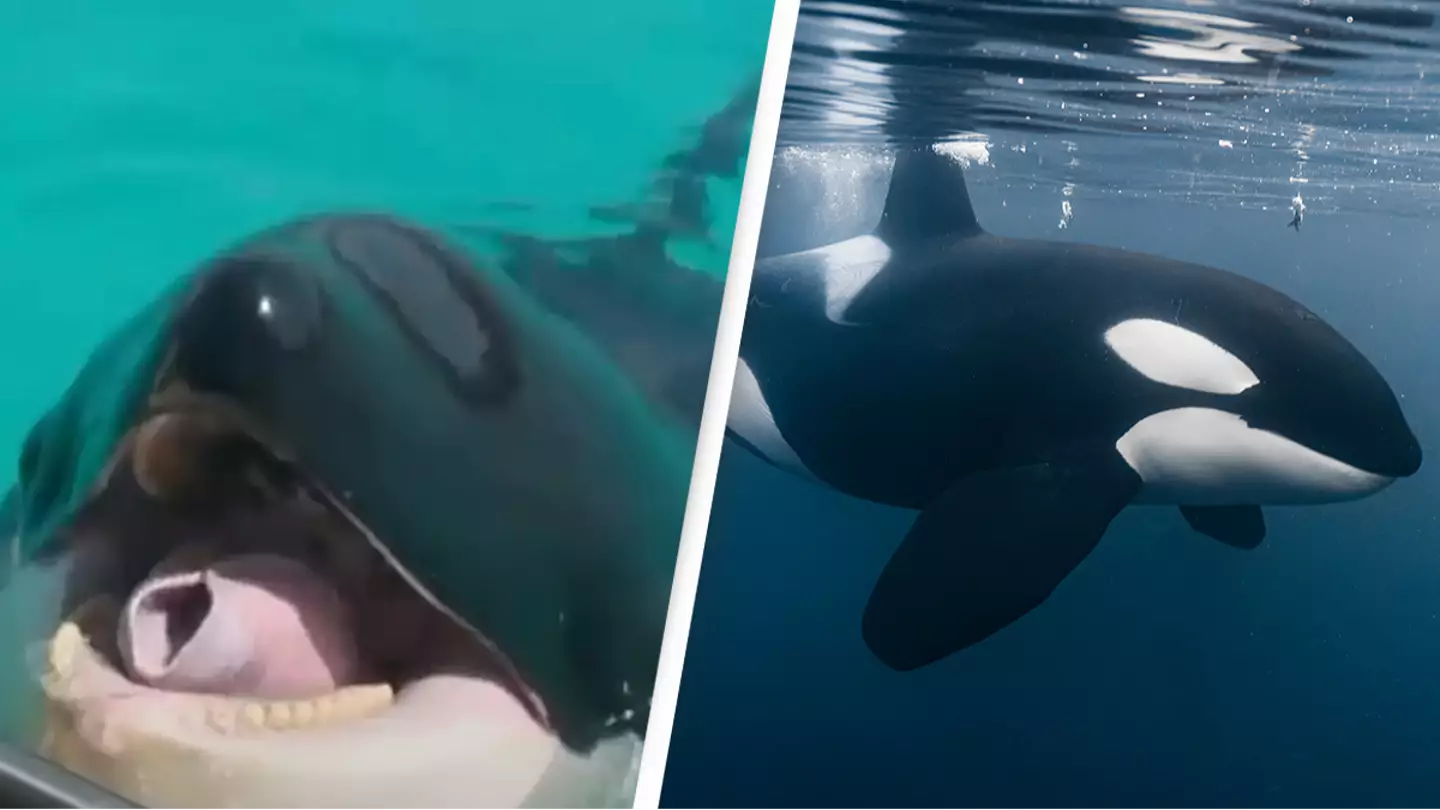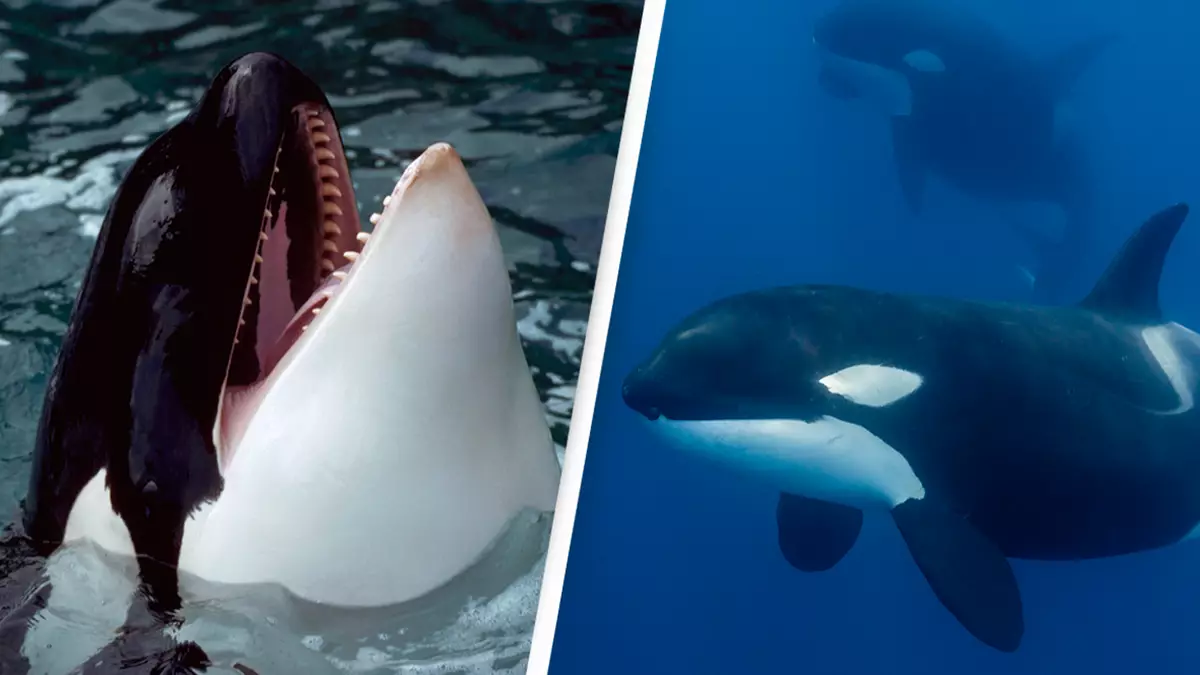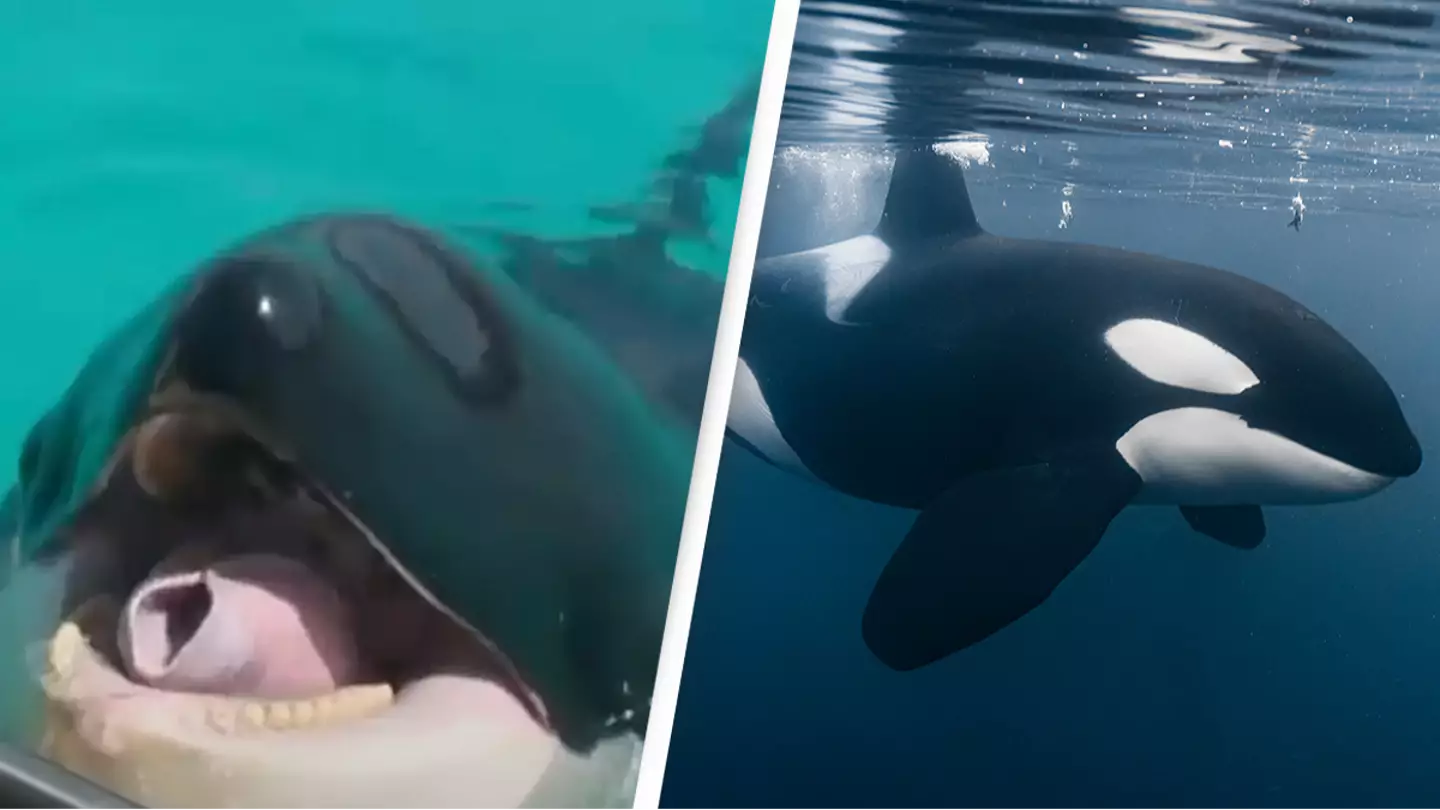The Talking Orca: Unveiling the Mystery of Wikie’s Speech Imitation

There are moments in life that challenge our understanding of the world and stretch the boundaries of possibility. One such moment occurred when a recording emerged of a killer whale, known as Wikie, mimicking human speech. A deep, eerie sound that seems to whisper words like “hello,” “Amy,” and even an attempt at counting “one, two.” To those listening, it sounds as though someone is whispering from the depths of the ocean. And that sensation is both fascinating and terrifying. The recording, which has left many astonished, also brings to light something even more profound: the remarkable cognitive ability of orcas to imitate human speech. This feat, accomplished by Wikie in a marine park in France, opens a window into the mind of one of nature’s most intelligent animals.
The Whale Who Spoke: Wikie’s Journey
Wikie, a female orca, was a key subject in a groundbreaking study on animal intelligence and communication. Unlike any orca before her, Wikie’s training involved mimicking human speech—an idea that seemed, at first, almost too far-fetched to be possible. Orcas, known for their complex vocalizations and social structures, are already fascinating creatures. They communicate with each other in what is often described as an intricate series of clicks, whistles, and calls. But the ability to imitate human speech? That was something else entirely.
Wikie was trained at a marine park in France, where researchers introduced her to sounds she had never heard before. The goal was to see if she could replicate these novel sounds. Initially, these sounds were whale calls, to which she responded with impressive accuracy. However, the real twist came when the trainers began to introduce human words into the mix. And Wikie, ever the quick learner, began to replicate the sounds—first “hello,” then “Amy,” and even the numbers “one, two.”

Astonishing Imitation
The most fascinating aspect of Wikie’s ability to imitate human speech is the accuracy with which she performed these tasks. Listeners were struck by how closely her imitations resembled the human sounds. Though the voice came from a whale, the syllables were clear enough to be recognized as human speech. Her attempt at saying “hello” was rough around the edges, yet it still held a resemblance to the human greeting. Similarly, her attempt to say “Amy” was breathy, but the sound was eerily close to the way a person would say it.
The most startling thing, however, was how quickly Wikie adapted to the new task. Many animals are able to mimic sounds, but Wikie’s ability to repeat words with such precision on the first try was nothing short of extraordinary. In fact, when researchers tested her imitations, they found that listeners could identify the sounds Wikie produced with far more accuracy than chance. This level of success in imitation is highly significant in animal research.
Not Just a Party Trick
While the idea of an orca mimicking human speech may sound like a novelty or a party trick, the implications of these findings go far beyond entertainment. Researchers were careful to emphasize that Wikie was not actually speaking a language—she was mimicking sounds, and that’s a very important distinction. There is no evidence to suggest that Wikie understood the meaning of the words she was repeating. She didn’t know what “hello” meant, nor could she grasp the concept of “one, two.” Nevertheless, the fact that she was able to imitate these sounds with such precision reveals a great deal about her cognitive abilities.
Orcas are known to have complex communication systems within their pods. They use different calls and sounds to convey a range of meanings, from signaling distress to communicating their location. In the wild, orcas from different regions often have unique dialects, with each pod developing its own set of calls. The ability to imitate new sounds, as demonstrated by Wikie, may help explain this diversity in orca communication. The vocal flexibility Wikie showed in her training suggests that orcas could learn new sounds through imitation, which could lead to the development of regional dialects and even new ways of communicating within different pods.

The Deep Implications
What does this mean for our understanding of orca intelligence? For years, researchers have debated the cognitive capacities of various animal species, with primates often being seen as the most advanced in terms of social learning and communication. However, Wikie’s ability to imitate human speech forces us to reconsider the intelligence of non-human animals, particularly marine life. Orcas have long been known for their social complexity, with intricate family structures and behaviors that suggest a high level of intelligence. But Wikie’s actions suggest that orcas may be even more cognitively advanced than we previously imagined, potentially on par with some primates when it comes to the ability to learn through imitation.
The implications for conservation are also significant. As humans continue to encroach on the natural habitats of orcas and other marine animals, understanding their complex communication systems and cognitive abilities is vital. We may find that protecting orca habitats is not just important for their survival as a species, but also for preserving their rich cultural and social structures. The ability of orcas to pass down information through vocal learning could mean that they have complex ways of organizing their social groups and behaviors. Disrupting these systems could have far-reaching consequences.
The Emotional Impact
Hearing an orca imitate human speech brings with it an emotional reaction that’s hard to shake. There’s something unsettling about hearing an animal, an apex predator no less, produce sounds so similar to our own. The first time many people hear the clip, they may feel a sense of wonder. It’s awe-inspiring to realize that an animal, so distant from us in many ways, is capable of such a human-like act. But there’s also something slightly eerie about it—a reminder of how much we still don’t understand about the intelligence of the animals we share this planet with. Hearing an orca speak, even in imitation, is a visceral reminder of the mystery of the animal kingdom.
The beauty of this discovery lies not just in the extraordinary nature of the feat itself but also in the way it connects us to these creatures. Orcas, with their sophisticated social structures and deep bonds, are already fascinating. But the ability to mimic human speech adds a layer of familiarity and intimacy that’s hard to ignore. It’s as though we’re hearing a message from another mind—a mind that is alien in many ways but is still capable of communicating in a way we can recognize.

A Window Into Another Mind
Wikie’s mimicry offers a rare glimpse into the mind of an orca, allowing us to see how these animals learn and communicate. While her imitations don’t necessarily mean she understands the words, they show us something deeper: a reflection of the cognitive processes that allow orcas to interact with their world and each other. It’s not just a neat trick—it’s a window into the mind of an intelligent, social animal.
This discovery also serves as a reminder of the deep, uncharted mysteries that still lie beneath the ocean’s surface. Orcas, like many marine animals, are still shrouded in mystery, and the more we learn about their cognitive abilities, the more we realize how much we have yet to understand. Wikie’s story highlights just how much we stand to learn from these magnificent creatures, if only we take the time to listen.
Conclusion: A New Era of Animal Research
As research into animal intelligence continues to evolve, Wikie’s story marks a turning point. It’s a moment that reminds us of the complex minds of animals we once thought we understood. While Wikie’s speech imitation may seem like an isolated incident, it has profound implications for how we view animal intelligence. It challenges us to reconsider the ways we think about communication, learning, and even culture in the animal kingdom.
We may never know exactly what an orca is thinking when it mimics human words, but we do know that these creatures are far more complex than we ever imagined. Wikie’s remarkable abilities remind us that the ocean is full of wonders, and the creatures that inhabit it have far more to teach us than we could ever have dreamed. And for that reason, we must continue to listen, learn, and protect these extraordinary beings.






